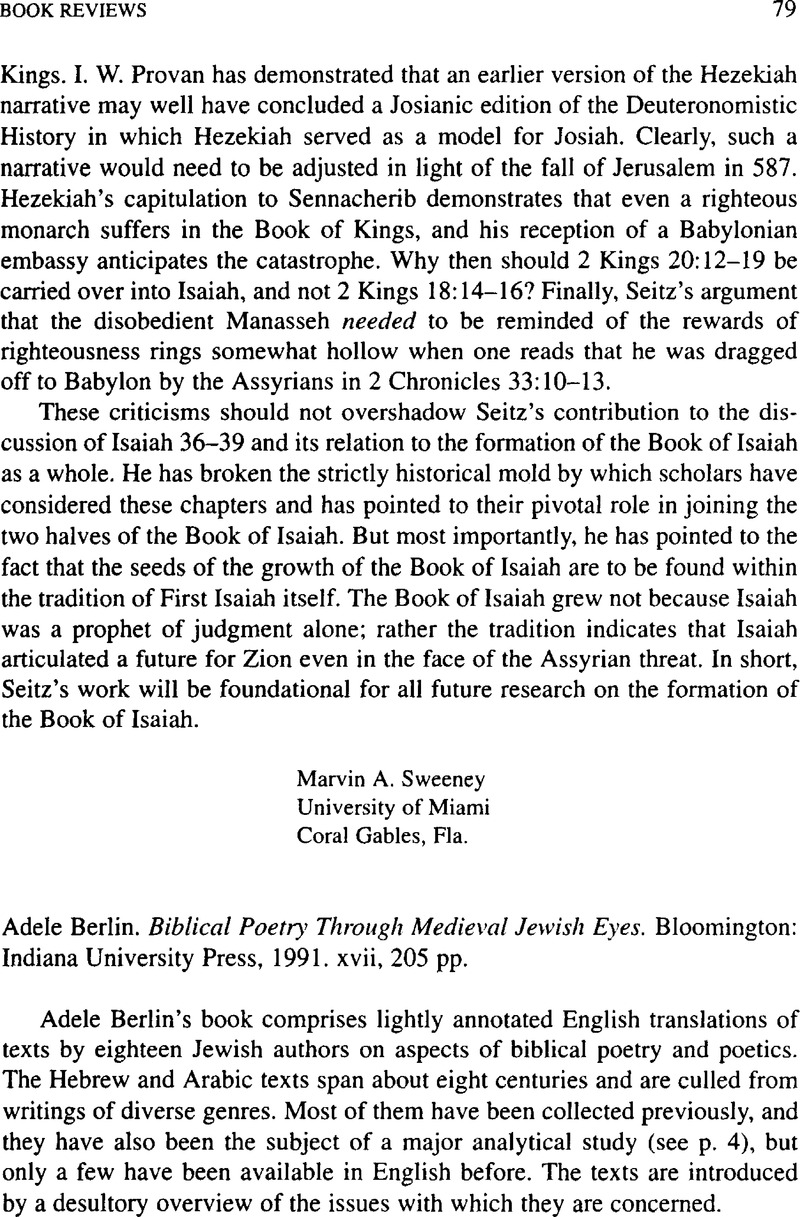No CrossRef data available.
Published online by Cambridge University Press: 15 October 2009

1. On the other hand, one misses such texts as the surviving fragment of Saadiah'S poetics (in N. Allony'S edition of the ![]() [Jerusalem, 1969], pp. 386–389); also Meiri'S important remarks on the difference between
[Jerusalem, 1969], pp. 386–389); also Meiri'S important remarks on the difference between ![]() and
and ![]() (in the introduction to his Proverbs commentary, ed. M. Meshi-Zahav [Jerusalem, 1969], pp. 5–8), ignored in the discussion of the topic on pp. 33–35. With the notable exception of the Abravanel selections (pp. 119–133),
(in the introduction to his Proverbs commentary, ed. M. Meshi-Zahav [Jerusalem, 1969], pp. 5–8), ignored in the discussion of the topic on pp. 33–35. With the notable exception of the Abravanel selections (pp. 119–133), ![]() is excluded from the anthology. The author asserts that “discussions of poetry were not apt to be found in commentaries” (p. 10). It would have been useful, nonetheless, to cite instances of such expressions as
is excluded from the anthology. The author asserts that “discussions of poetry were not apt to be found in commentaries” (p. 10). It would have been useful, nonetheless, to cite instances of such expressions as ![]() and
and ![]() –especially when they are associated with stylistic elegance
–especially when they are associated with stylistic elegance ![]() ; also Ibn Ezra'S controversial comment on Qohelet 12:9, where he may be implying the existence of metrical poetry in the Bible. On the last item, see Shlomo Almoli,
; also Ibn Ezra'S controversial comment on Qohelet 12:9, where he may be implying the existence of metrical poetry in the Bible. On the last item, see Shlomo Almoli, ![]() ed. H. Yalon (Jerusalem, 1965), p. 52 with n. 2; in general, see Kugel, James L., The Idea of Biblical Poetry: Parallelism and Its History (New Haven, 1981), pp. 172–181.Google Scholar
ed. H. Yalon (Jerusalem, 1965), p. 52 with n. 2; in general, see Kugel, James L., The Idea of Biblical Poetry: Parallelism and Its History (New Haven, 1981), pp. 172–181.Google Scholar
2. Kaspi, , ![]() , ed. Isaac Last, 2 vols. (Pressburg, 1903), 1:184.Google Scholar
, ed. Isaac Last, 2 vols. (Pressburg, 1903), 1:184.Google Scholar
3. Talmage, Frank, “Apples of Gold: The Inner Meaning of Sacred Texts in Medieval Judaism,” in Jewish Spirituality from the Bible Through the Middle Ages, ed. Arthur, Green (New York, 1987), pp. 313–355.Google Scholar
4. Qafih, Ed. Y., 3 vols. (Jerusalem, 1972), 1:11–12; trans. S. Pines, The Guide of the Perplexed (Chicago, 1963), pp. 11–12.Google Scholar
5. ![]() , 1:83.
, 1:83.
6. (Naples, 1487), ad loc. Immanuel'S commentary on Proverbs 1:1 provides an instructive contrast to Kaspi'S introduction.